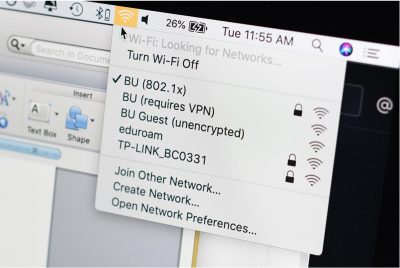A crash of Boston University’s 802.1x WiFi network Sunday has raised concerns about the consistency of the university’s WiFi connection. With

midterms approaching for many students, reliable connection to online resources has been a top concern for many.
On top of the internet traffic caused by midterm studying, the housing lottery numbers were released on Tuesday, which caused the housing portal to temporarily shut down.
BU’s Information Services and Technology department said in a statement that Sunday morning’s crash was not due to high traffic, but was rather the result of necessary maintenance taking place.
“The Sunday morning wireless incident was due to some emergency maintenance that needed to be performed to address a router failure,” the department wrote. “This ultimately caused one set of our high availability wireless concentrators to get into a state where they would not complete the authentication process for any ‘BU (802.1x)’ and ‘eduroam’ services.”
Colin Riley, a BU spokesperson, wrote in an email that Information Services and Technology does their best to avoid crashes such as this, but that the occasional outage is inevitable.
“IS&T works hard to maintain the WiFi on campus and limit downtime,” Riley wrote, “but sometimes it is unavoidable, as in this past Sunday’s outage.”
While Sunday’s outage was caused by a technical fluke during maintenance, students often find BU’s WiFi to be unreliable and slow.
According to Information Services and Technology, there have been 59 incident reports concerning wireless internet service since Jan. 1. This statistic does not include the Sunday incident.
“The resolutions are a mix of client device issues and coverage. If we find coverage issues we address them,” they wrote in their statement.
Despite the seemingly low incident report rate, students at BU frequently complain about poor internet service on-campus. The problems have become a regularly discussed meme on many platforms, such as the “BU Memes for Normy Teens” Facebook page.
The number of cases reported is unlikely to encompass the total number of WiFi problems experienced by BU students as not all reports of poor connection are reported. BU Information Services and Technology wrote that they are actively working on the issue on campus.
“The University has embarked on a several year refresh of the wireless infrastructure for the [Charles River Campus],” the department wrote.
Priyanka Ramanathan, a freshman in the College of Arts and Sciences, said she frequently experiences difficulties connecting to the WiFi available for BU students.
“Anytime I open [my laptop], it automatically connects to the guest WiFi, not the actual WiFi,” Ramanathan said. “I always have to click on the actual WiFi, and it takes a minute to connect.”
Students rely on BU’s campus WiFi for many of their daily activities, both recreational and academic. Sinead O’Melinn, a sophomore in the College of Communication, said the WiFi’s inconsistency disrupts her academics, both in and out of the classroom.
“It cut out two nights ago when I was trying to work on something,” O’Melinn said. “It’s just generally pretty inconsistent throughout the day. It cuts out in the middle of class sometimes.”
Juliana Helfer, a freshman in Sargent College of Health and Rehabilitation Sciences, said that wireless outages during class could be caused by an increased volume of internet usage in a small area.
“In a lecture with 200 or more people in it,” Helfer said. “We’re all on our laptops, so that could be why.”
While increased internet traffic during midterms season is a concern, students are also worried by other times when specific BU services are down. Helfer said one concern for him is the speed of WiFi connection during class registration times.
“Some people don’t get the classes they want because of the WiFi,” Helfer said.























































































































